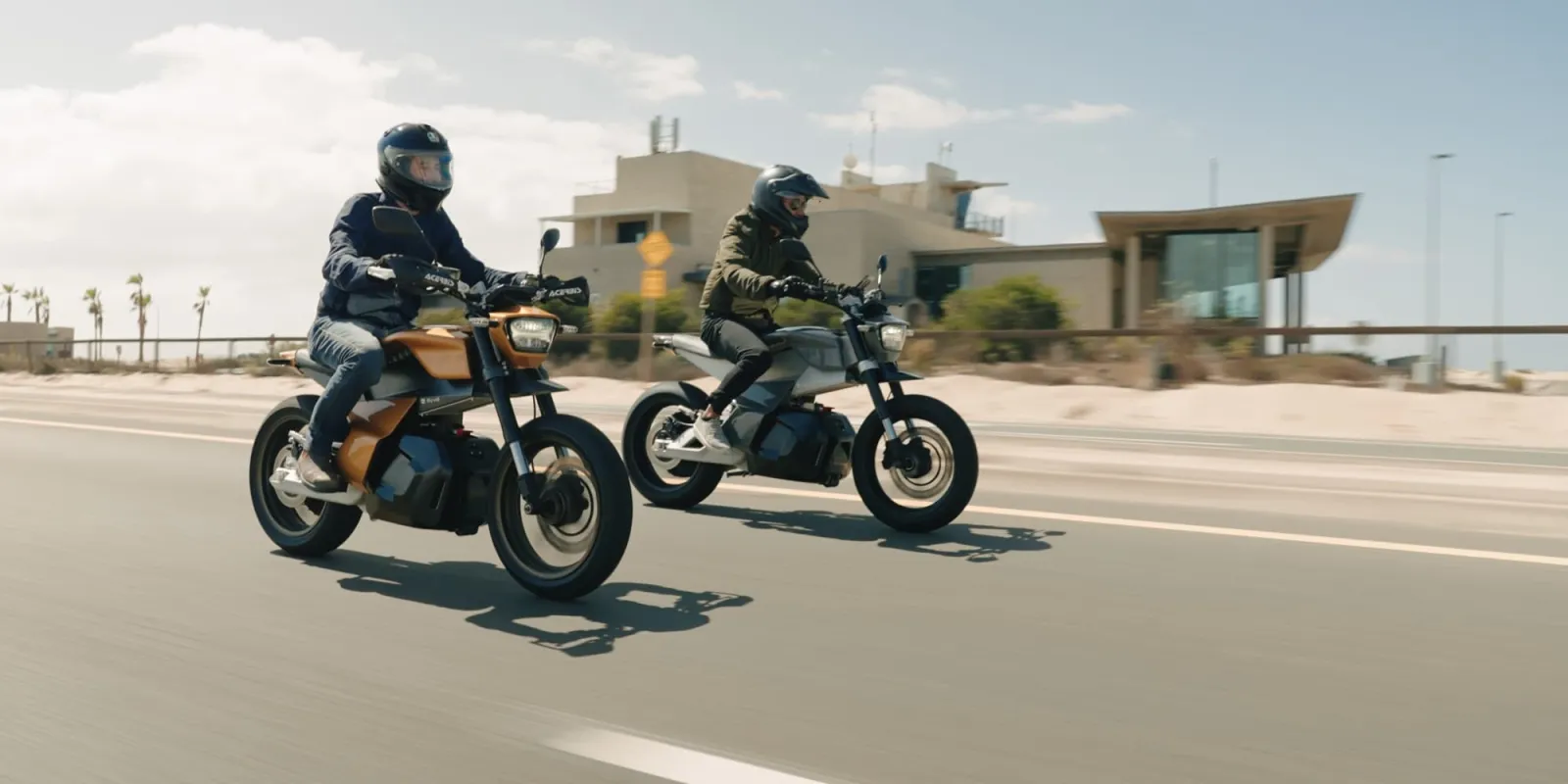
The Ryvid Anthem electric motorcycle is one of the most innovative light electric motorcycles we’ve seen in years. The bike already began taking pre-orders, with deliveries expected next year, and I recently got the chance to test out a pair of Ryvid Anthem prototypes during a trip to LA.
At just $7,800, the Anthem is one of the most affordable highway-capable electric motorcycles on the market. And keep in mind that this is a US-designed and US-assembled bike too, which makes that price even more impressive.
Terms like “budget-level” and “affordable” get thrown around a lot these days, and the concept of an affordable anything will always be relative. A $7.8k price tag would make for an expensive toothbrush or an affordable house, for example. But in the high-dollar electric motorcycle industry, where offerings from major players like LiveWire, Zero Motorcycles and Energica run from $17K-$25K, the Ryvid Anthem is downright budget-friendly at a third of the price.
And yet it still offers pretty much everything an urban rider needs to get around town, commute from the suburbs to the city and back, and even hop on the highway while keeping up with traffic.
Check out my test ride experience in the video below to see the Ryvid Anthem in action.
Ryvid Anthem test ride video
What makes this bike so special?
The Ryvid Anthem is a total rethinking of how a motorcycle should be built.
It lacks a conventional frame and instead uses folded metal to create a lightweight but sturdy box frame.
The frame uses mechanical fasteners instead of welding in as many joints as possible to create a simpler assembly process that directly results in a bike that is easier — and thus less costly — to produce.
It also allowed the designers to create interesting new features, such as adjustable suspension points and head tube angles that can completely change the ride and feel of the bike.
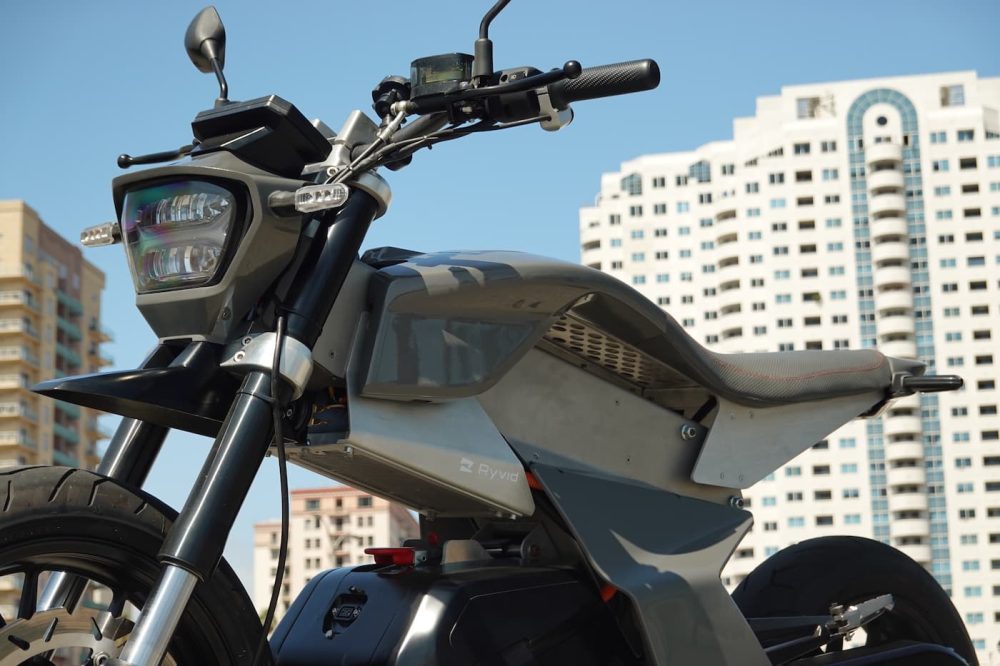
Those types of modifications require tools and time to adjust, but there’s another cool feature that can be adjusted in the middle of the ride. The saddle height can raise and lower by 4 inches (10 cm), thanks to an actuator built into the frame.
Just a push of a button on the handlebars is all it takes to send the seat moving up or down, creating a comfortable position for just about any sized rider. You can even keep the seat higher for cruising and then drop it down at a traffic light for a more comfortable flat-footed stance. It’s a level of customization that has never before been possible in the motorcycle industry.
To see it in action, make sure you watch my first ride video above.
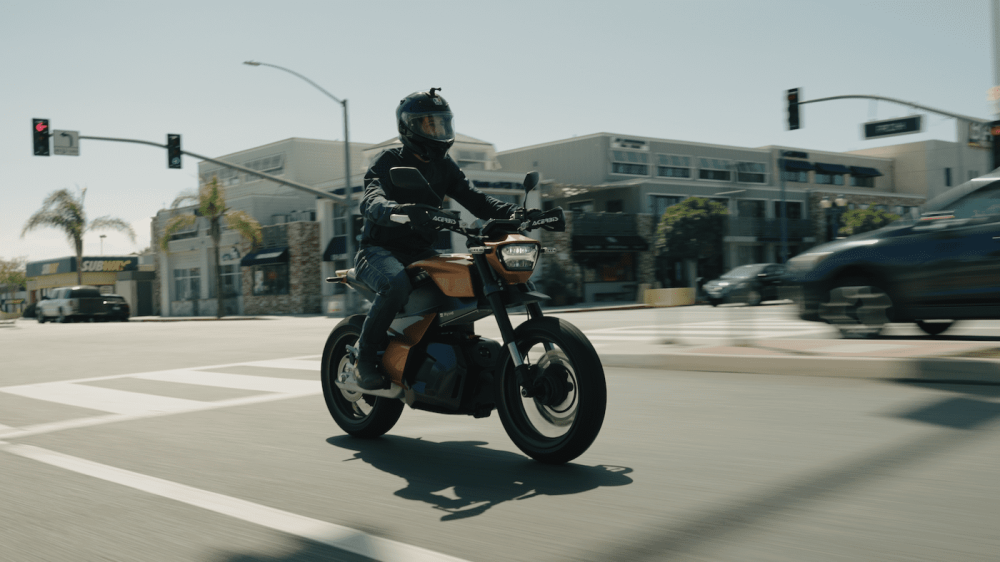
So sure, the bike has a neat design. But what about the performance? Is it going to knock your socks off?
Probably not. But then again, it wasn’t meant to.
This is a commuter bike, after all. It’s not meant to win traffic light races or leave a rubber tire snake on the ground when you take off.
But the performance isn’t half bad either. I knew getting onto the bike that the 13.5 kW (18 hp) peak power wasn’t going to feel anything like the LiveWire and Energica electric motorcycles I’ve tested before. And it didn’t. But it was still plenty powerful off the line. Cruising down PCH toward Long Beach with company founder Dong Tran had us flying off at every green light, well ahead of any cars around us. And that’s exactly what a commuter motorcycle needs — enough power and torque to fly out ahead of traffic, but not so much that you end up with a massively heavy bike.
At around 240 pounds (108 kg), there just isn’t that much bike beneath you. It’s easy to flick around and have fun because it feels like a light little dirt bike, yet it has you cruising the pavement like you were on a much more powerful ride.

There are also two different gear ratios that the bike can be outfitted with. If you need to hit higher speeds, the shorter gear ratio will let you keep flying all the way up to 75 mph (120 km/h).
And it likes it too, preferring those higher speeds to keep the motor in its efficient range. When operated at lower city speeds, that gearing tends to eat through more battery.
If you don’t mind losing 10 or so miles per hour off the top end, the taller gearing option gives you an even torquier ride that flies off the line and tends to be more efficient at city speeds.
That ratio was my preference, but your mileage may vary.
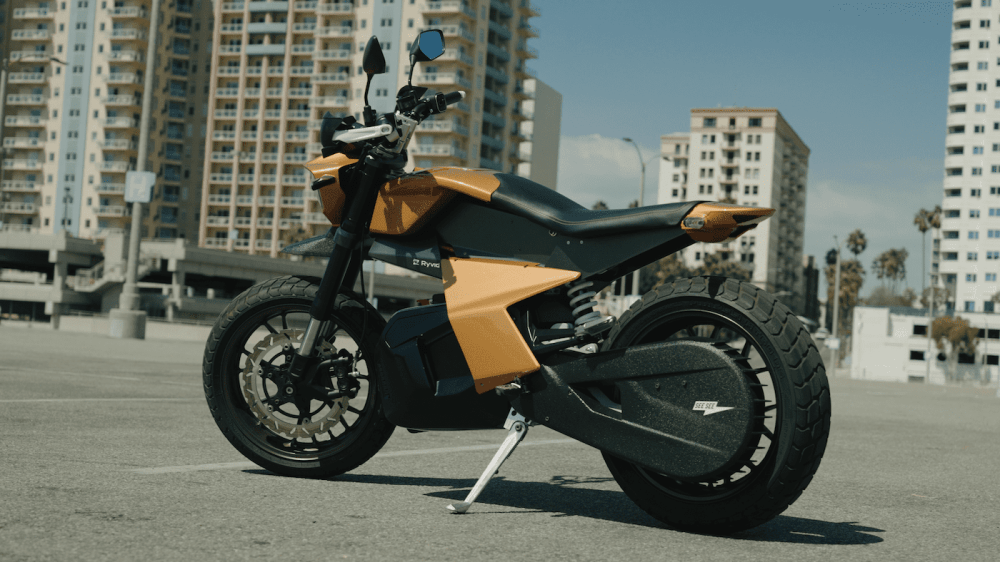
Part of that lightweight design comes from the small battery. It’s just a 4.3 kWh pack, so it’s not going to turn this into a touring bike.
The battery can be charged on the bike using an off-board charger on either a 110V or 220V wall plug (like you’d find in any garage), but the battery can also be removed for charging remotely.
There’s a neat design that includes built-in wheels that let you pivot the battery down and then roll it into your home or apartment. The quick-release battery means that just because you live on the 10th floor with no garage charging options doesn’t mean you can’t own an electric motorcycle. If you’ve got an elevator, you’ve got a way to get your battery into your home or apartment for charging.
By the time batteries in electric motorcycles and scooters reach 2.5 kWh or more, they usually become too heavy to reasonably function as removable batteries. It’s just too much to expect someone to carry. But this novel-wheeled system retains the utility of a removable battery without making the riders lift or carry the 65-pound (30-kg) battery.
As far as range goes, I only took a couple of short rides on the bike, so I can’t say that I’ve done a complete drain from full to empty. But the Ryvid Anthem has a 75-mile range rating in Eco Mode and a 50-mile range in Sport Mode, so you should be able to cover just about any commute. And since the battery is removable, you could theoretically roll it into the office and charge it under your desk.

What’s the ride like?
As a surprisingly peppy bike, the Ryvid Anthem feels like it’s ready to squirt out in traffic whenever you need it to.
The responsive handling of the lightweight bike adds to the confident feel, which is important for a motorcycle that is likely to be many people’s first ride.
With a much more affordable price than most electric motorcycles and all of the benefits that come with e-motos, many new riders are joining the fray these days, thanks to electric drive. Those who didn’t previously see themselves as a biker or that didn’t want to deal with the maintenance of a gas-powered motorcycle are realizing that an electric motorcycle is largely just an overpowered electric bicycle, at least when it comes to control and ownership. And so a bike that is easy to ride is important for these types of new riders.
The Ryvid Anthem feels like the epitome of a first motorcycle. It’s light, and it’s powerful enough to have fun but not so powerful that you’ll immediately get into trouble – it’s got the utility necessary for daily life.
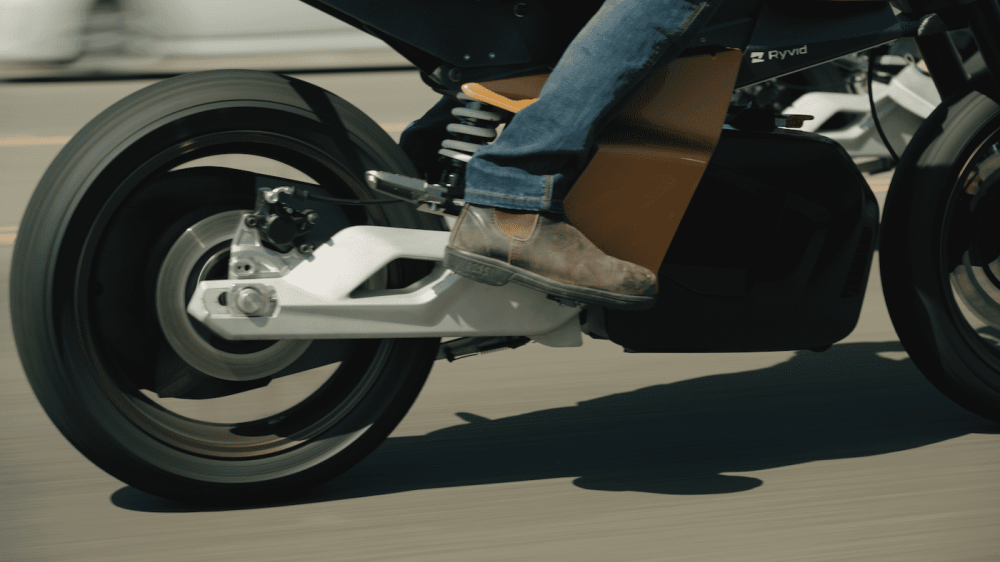
As much fun as I had cruising along the coast, I can see the bike excelling even more in crowded cities. It’d be the perfect bike to slice through traffic in New York City — if you were legally allowed to slice through traffic, that is. When will lane-splitting become more acceptable in the US?!
I can see it being great in Florida where most of the “urban” roads are posted at 50 mph and you need to be able to hit 60 mph just to keep up. And the added benefit of not having a rumbling heat pump between your knees will be nice on hot summer days.
I can see it in the Midwest where it would fit right into suburbia. You could use it as a daily commuter without waking your neighbors by starting a noisy motorcycle engine in the driveway each morning.
And of course, it’s a blast on the California coast where the Ryvid Anthem was born and where I got to test it.
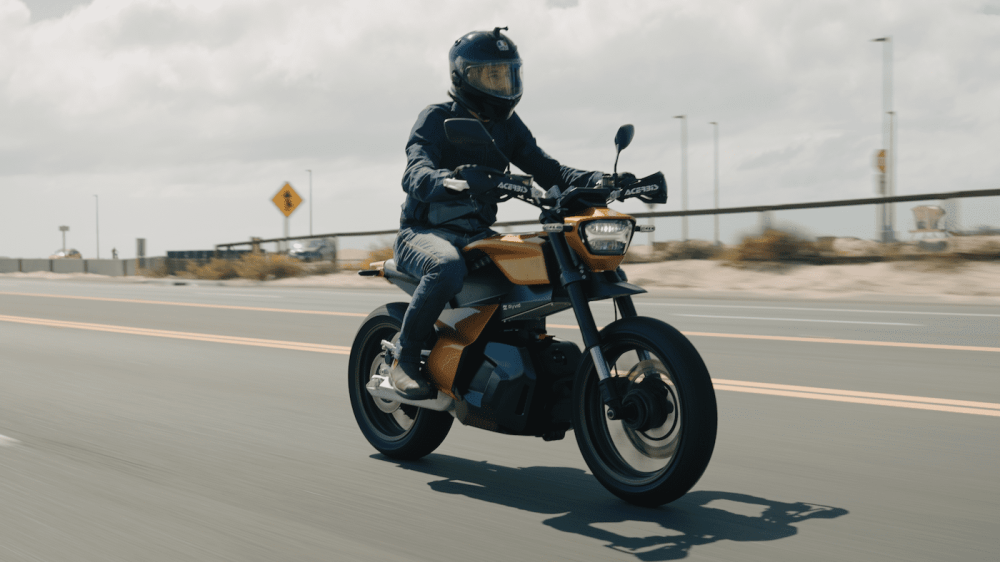
What are the downsides?
Like any bike, there are pros and cons.
As much as I enjoyed the Ryvid Anthem, I can still find its faults.
The belt drive isn’t as quiet as other bikes I’ve ridden, and there’s a bit of a higher pitch whine to it. Part of that might be that the sprockets aren’t their final designs, and I was of course riding prototype bikes. One of the two bikes I rode was louder than the other, and Dong explained that it was related to the sprocket, which wasn’t the ultimate component and would be replaced soon for an improved design.
The bike also doesn’t have the range to ride for as long as I would like. I enjoyed it so much that I would have loved to stay out longer, but I had to keep an eye on the range. Even just 50 miles of range in Sport Mode will leave you wanting more. If you’re riding for your commute, you’ll be time-limited anyway, so it won’t be an issue. But if you’re riding for fun on the weekend, that fun will end sooner than you’ll likely be hoping for.
Some old-school riders may not like the rear brake being on the left-handlebar lever, but that part I actually prefer. I know many guys that have been riding for years and years think of it as a scooter setup, and I get where they’re coming from. But I’ve always found hand brakes to be more comfortable. And without a clutch lever on the left bar anymore, I don’t see any reason to keep a foot brake for the rear. It frees up my feet to keep them squarely on the pegs where I want them, and I have better modulation with my fingers than my toes any day of the week.
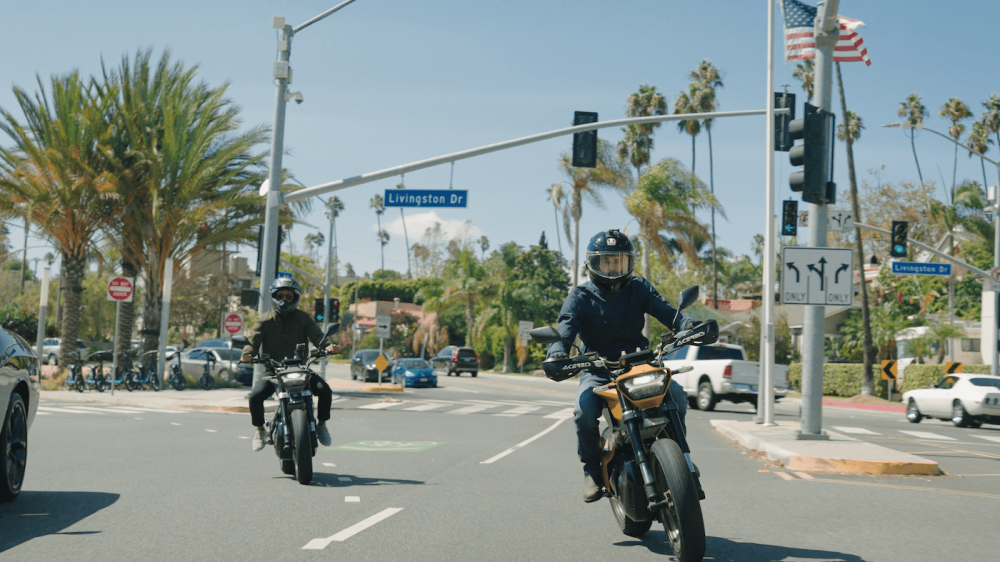
Sum it all up for me
All in all, I’m super excited about the future of the Ryvid Anthem. It won’t be here until next summer – at least that’s when the Launch Edition is expected to start making deliveries. But for $7,800, it feels like an awesome deal and worth the wait.
The bike rides well, has plenty of performance for commuter needs, and looks good too. I know that styling is subjective, but I think it’s a fresh take that we haven’t seen before and demonstrates how much electric drive can open up the design constraints of motorcycles.
With so few models available in this price range, the Ryvid Anthem is absolutely going to fulfill an important role in helping bring affordable electric motorcycles to the masses.
FTC: We use income earning auto affiliate links. More.

